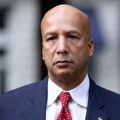By Tom Hays
Associated Press
NEW YORK – Four men snared last year in an FBI sting were convicted Monday of plotting to blow up New York City synagogues and shoot down military planes with the help of a paid informant who convinced them he was a terror operative.
The sting never put New Yorkers at risk. But the defendants “thought this was real — real bombs, real missiles — every step of the way,” Assistant U.S. Attorney David Raskin said during closing arguments.
A jury in federal court in Manhattan deliberated eight days before finding alleged mastermind James Cromitie and three co-defendants guilty of charges including conspiracy to use weapons of mass destruction and conspiracy to acquire and use anti-aircraft missiles to kill U.S. officers and employees.
Cromitie and David Williams were convicted of all eight counts, while Onta Williams and Laguerre Payen were convicted of seven of eight counts. Sentencing was set for March 24, when the defendants could face up to life in prison.
Afterward, U.S. Attorney Preet Bharara in a statement called homegrown terrorism a “serious threat” and added: “We are safer today as a result of these convictions.” He said the defendants agreed to plant bombs and use missiles “they thought were very real weapons of terrorism.”
Defense lawyers said they will appeal.
“This is a miscarriage of justice — just like the whole trial and case,” said Susanne Brody, who represents Onta Williams.
The lawyer for Payen, Samuel Braverman, said his client was “stunned.”
The trial featured 13 days of testimony by undercover informant Shahed Hussain, who met Cromitie at a mosque north of New York City. Prosecutors also relied on hundreds of hours of video and audiotape of the men discussing the scheme at the informant’s home, handling fake weapons — even praying together.
The defense sought to diminish the tapes’ impact by calling them a “movie written, produced and directed” by the FBI.
The film director, lawyers said, was Hussain — a 53-year-old Pakistani immigrant they sought to portray as a master manipulator who entrapped a crew of aimless nobodies. They also argued he would do anything to win the government’s favor and escape serious punishment in a separate fraud case.
Hussain “is a liar, straight up,” Cromitie’s lawyer, Vincent Briccetti, told jurors. “He’s not just any old liar — he lied to you.”
Added Briccetti: “Without the help of the FBI, Cromitie wasn’t going to do anything.”
The FBI assigned Hussain in 2008 to infiltrate a mosque in Newburgh, about an hour north of New York. After meeting Cromitie, he told him he was a representative of a Pakistani terror organization that was eager to finance a holy war on U.S. soil.
Prosecutors alleged that in meetings with Hussain, the 44-year-old Cromitie hatched the scheme to blow up the synagogues in the Bronx with remote-controlled bombs. They say he also recruited the other men — Onta Williams, 34, David Williams, 29, and Payen, 28 — to help him shoot down cargo planes at the Air National Guard base in Newburgh with heat-seeking missiles. Onta and David Williams are not related.
Agents arrested the men in 2009 after they planted the devices — fakes supplied by the FBI — in the Riverdale section of the Bronx while under heavy surveillance.
In one of several videos played at trial, the men could be seen practicing with a shoulder missile launcher and praying together in a bugged warehouse in Connecticut two weeks before the planned attack. At the end of the tape, Cromitie, two of his cohorts and the informant bow their heads in prayer.
In other tapes, Cromitie was heard ranting against Jews and expressing his desire to retaliate against U.S. military aggression in the Middle East.
“I’m ready to do this damn thing,” he said. “Anything for the cause.”
Prosecutors said the tapes proved the defendants didn’t need prompting by the defendant to launch an attack.
“The FBI did exactly what it’s supposed to do — it caught four dangerous men before they could do any real harm,” Raskin said. “Ordinary people wouldn’t even dream of what these defendants did.”
Last week, a judge denied a request for a mistrial after a juror came across a document in an evidence binder that shouldn’t have been there. The juror was dismissed.















Leave a Comment